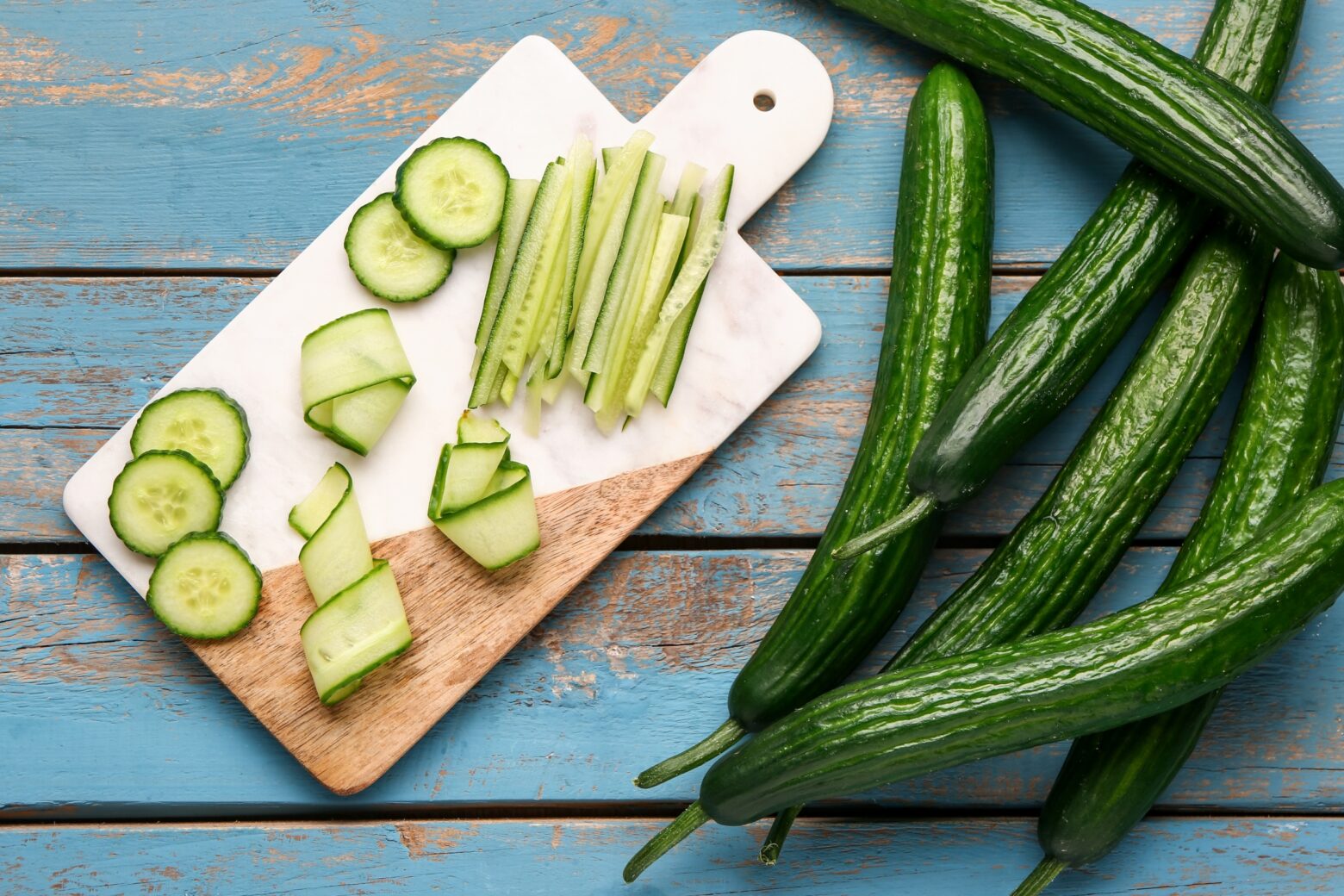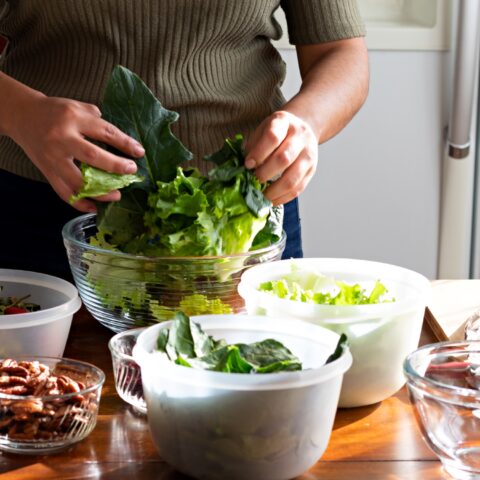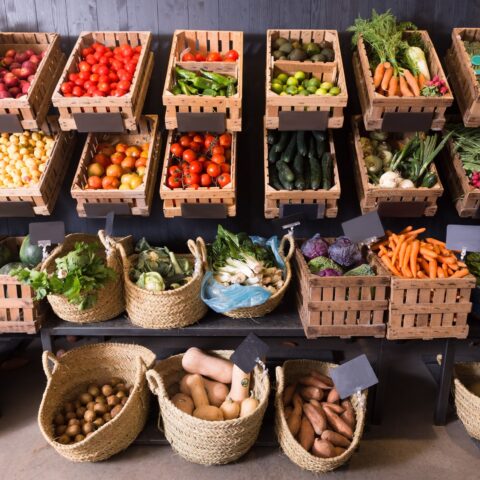Cucumber Benefits & Culinary Uses

Cucumbers are a staple in salads and refreshing drinks thanks to their mild taste, crisp texture, and hydrating qualities. Whether enjoyed raw, pickled, or blended into smoothies, cucumbers are a versatile fruit with much to offer—yes, we said fruit! Cucumbers are generally considered vegetables in culinary contexts, even though they are botanically fruits. Here’s what else you may not have known about cucumbers and some delicious ways to enjoy them.
What Are Cucumbers?
Cucumbers (Cucumis sativus) belong to the Cucurbitaceae family, which also includes pumpkins, squash, and melons. This creeping vine produces long, cylindrical fruits that are most commonly green with smooth or slightly bumpy skin. However, cucumbers can also grow in yellow, white, and even round, apple-sized varieties. [1]
Cucumbers have been cultivated for over 3,000 years. [2] They are believed to have originated in India, where wild cucumbers still grow today. They were later cultivated and spread to Greece, Rome, and China, eventually becoming popular throughout Europe by the Middle Ages. [3]
Today, cucumbers are grown worldwide, with China being the largest producer. In the United States, most commercially grown cucumbers come from Florida, Georgia, and California. [4]
How Cucumbers Are Cultivated
Cucumbers thrive in warm, sunny conditions with well-drained, fertile soil. They can be grown directly from seeds or young seedlings transplanted into the garden. Cucumber seeds are typically sown half an inch deep and spaced 12 inches apart. They can be grown on the ground or trained to climb trellises to save space. [5]
Common pests to look out for include cucumber beetles, aphids, and spider mites. Powdery mildew and downy mildew are also concerns, particularly in humid environments.
Cucumbers are usually ready to be harvested 50–70 days after planting, depending on the variety. They should be picked while still firm and crisp, as overripe cucumbers become bitter.
Cucumber Nutritional Benefits
Cucumbers may be mostly water (about 95%), but they also pack essential nutrients and health benefits. [6]
- Hydration Support: Thanks to their high water content, cucumbers are excellent for promoting hydration and electrolyte balance, especially during hot weather or after exercise.
- Antioxidant Power: Cucumbers contain antioxidants such as beta-carotene, flavonoids, and tannins, which may help reduce oxidative stress and inflammation. [7]
- Digestive Health: The fiber in cucumbers, particularly in the skin, helps support healthy digestion and regularity.
- Heart Health: Cucumbers provide potassium and magnesium, both of which play a role in maintaining healthy blood pressure and proper blood clotting. [8,9]
- Skin Soothing: Known for their cooling and hydrating properties, cucumbers are often used topically to soothe irritated skin and reduce puffiness.
How to Select and Store Cucumbers
To find fresh, good-quality cucumbers, look for fruits that are firm, smooth, and evenly colored. Soft spots, wrinkles, or yellowing indicate that a cucumber may be past its prime.
For the best taste and texture, cucumbers should feel heavy for their size. Store them in the refrigerator, ideally in the crisper drawer, and use them within a week for optimal freshness.
Wrapping cucumbers in a paper towel and placing them in a plastic bag can help maintain moisture.
How to Prep and Use Cucumbers
Cucumbers are commonly enjoyed raw but can also be prepared in various dishes. However you eat them, always rinse cucumbers thoroughly under cool running water. You can choose to peel them or leave the skin on for added fiber and nutrients.
Cucumbers are a versatile addition to many dishes and serve well as sides. Here are some delicious ways to enjoy cucumbers on The Paleo Diet®:
- Raw in Salads: Add a refreshing crunch to green salads, Greek salads, or this Cucumber-Tomato Salad.
- Poke Bowls: For a classic poke bowl, Paleo-style, try this rice-less Tuna Poke Bowl. Or, for a cooked version, try a Salmon Poke Bowl with Spicy Lime Mayo.
- Dips & Spreads: Slice into sticks and pair with guacamole or hummus. Cucumbers also play a starring role in the Greek sauce, tzatziki.
- Pickled: Make homemade Dill Pickles or quick-pickled cucumber slices in vinegar for a tangy snack.
- Infused Water: Upgrade your hydration by infusing water with cucumber slices and mint for a cooling, hydrating drink.
- Smoothies & Juices: Blend cucumbers with leafy greens or functional herbs and spices for a detoxifying beverage. Here’s a Kale Cucumber Smoothie, or try this Watermelon Cucumber Basil Lemonade.
- Cold Soups: Try our Watermelon and Cucumber Gazpacho for a light, refreshing meal that’s perfect for the summer.
Don’t forget that cucumbers can also promote skin health from the outside in. If you find your cucumbers aren’t the most flavorful, don’t throw them away. Instead, use them to reduce the appearance of puffy eyes. Simply slice into rounds and stick them in the freezer; then you’ll have them on hand to enhance your self-care routine.
References
- Cucumbers – Overview | ScienceDirect Topics [Internet]. www.sciencedirect.com. Available from: https://www.sciencedirect.com/topics/agricultural-and-biological-sciences/cucumbers
- Cucumber – WordReference.com Dictionary of English [Internet]. Wordreference.com. 2025 [cited 2025 Mar 29]. Available from: https://www.wordreference.com/definition/cucumber
- Trinklein D. Cucumber: A Brief History (David Trinklein) [Internet]. ipm.missouri.edu. 2014. Available from: https://ipm.missouri.edu/MEG/2014/3/Cucumber-A-Brief-History/
- Know Your Produce Commodity | Cucumber Market | Cucumber Production [Internet]. Produce Blue Book. 2025 [cited 2025 Mar 29]. Available from: https://www.producebluebook.com/know-your-produce-commodity/cucumbers
- Boeckmann C. Cucumbers [Internet]. Old Farmer’s Almanac. 2019. Available from: https://www.almanac.com/plant/cucumbers
- FoodData Central [Internet]. fdc.nal.usda.gov. Available from: https://fdc.nal.usda.gov/food-details/2346406/nutrients
- Pandey KB, Rizvi SI. Plant Polyphenols as Dietary Antioxidants in Human Health and Disease [Internet]. Oxidative medicine and cellular longevity. 2009. Available from: https://pubmed.ncbi.nlm.nih.gov/20716914/
- P. Richard Grimm, Tatomir A, Rosenbaek LL, Bo Young Kim, Li D, Delpire EJ, et al. Dietary potassium stimulates Ppp1Ca-Ppp1r1a dephosphorylation of kidney NaCl cotransporter and reduces blood pressure. ˜The œJournal of clinical investigation/˜The œjournal of clinical investigation. 2023 Nov 1;133(21). Available from: https://pmc.ncbi.nlm.nih.gov/articles/PMC10617769/
- Onor IO, Hill LM, Famodimu MM, Coleman MR, Huynh CH, Beyl RA, et al. Association of Serum Magnesium with Blood Pressure in Patients with Hypertensive Crises: A Retrospective Cross-Sectional Study. Nutrients [Internet]. 2021 Dec 1 [cited 2022 Mar 25];13(12):4213. Available from: https://www.mdpi.com/2072-6643/13/12/4213/htm
Betsy Schroeder
Betsy does research and writing for a few different websites in the natural health field after taking Masters level courses in Nutrition & Functional Medicine through the University of Western States.
More About The Author




